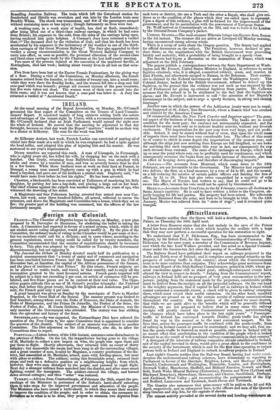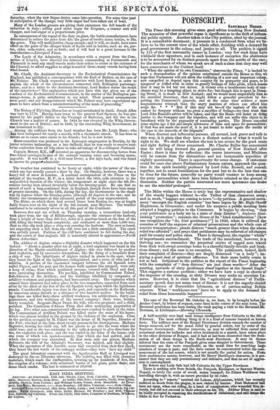IftisctIlantotts.
The Gazette notifies that the Queen will hold a drawingroom, at St. James's Palace, on Thursday the 10th April next.
A letter from Hanover states that the last malady in the eyes of the Prince Royal has been attended with a crisis which inspires the oculists with a hope that they may now perform a successful operation for his restoration to sight We understand that T. P. Dickenson, Esq., has been recommended to her Majesty, by Sir Robert Peel, for the vacant Gommissionership of Customs. Mr. Dickenson was for some years a member of the Commission of Revenue Inquiry, over which the late Lord Wallace .presided, and has acted as a Special Commis- sioner under the Income-tax Act since the passing of it.—Standard.
The Railway Board have published their report on railways projected in the North and North-west of Ireland; and it comprises some general remarks on the prospects of railway traffic in that country; about which the Commissioners seem to be more cautious than sanguine. They acknowledge great assistance from the Second Report of the Irish Railway Commissioners, printed in 1838; whose ge- neral conclusions appear still to stand good; although subsequent events have altered the view in respect to details. "Judging from the Commissioners' report, railways in Ireland hold out no prospect of very great remuneration to the pro- jectors: judging from the statement made by the projectors, considerable profits must be derived from the receipts on all the projected railways. On the one hand is the weighty argument, that if capital be laid out in railways in Ireland which cannot command a reasonable return, a check will be given to railway enterprise there, which must retard their useful extension. On the other hand, manifold advantages are pressed on us as the certain results of railway communications throughout the country. On this portion of the subject we must o
that while we are quite alive to the benefits which will be generally difltised thereby, we are not prepared to believe that in many cases the railway receipts will greatly exceed the Commissioners' estimates, notwithstanding the changes which have taken place in the last eight years." "Passenger- traffic in Ireland has converged towards Dublin; goods traffic has always found its way to the nearest or to the most convenient seaport. We be- lieve that, unless the passenger-traffic be combined with the goods-traffic, lines of railway in Ireland cannot at present be maintained; and we may add, that un- less the goods-traffic be fostered as much as possible, railways in Ireland will by no means effect that amelioration in the condition of the people which is looked forward to as the result of well-combined railway communication in that country." "A disregard of the interests of railway companies already established in Ireland, and of the capital invested in them, would give a great shock to the confidence in the security of the investment, which is now for the find time operating to induce persons both in Ireland and England to embark in railway projects in Ireland." Last night's Gazette notifies that the Rail way Board, having had under consi- deration the undermentioned railway schemes, have determined on reporting to Parliament in favour of the Aberdare, Brighton, Lewes and Hastings (Keymex Branch), Cockermouth and Workington Dunstable, London, and Birmingbam,
Erewash Valley, Manchester, Sheffield, Midland Junction, Newark and Shef- field, North Wales Mineral Railway (Extension), Preston and Wyre (Lytham and Blackpool Branches), Sheesvsbury, Oswestry, and Chester, Sunderland, Durham, and Auckland, Wear Valley; and recommending the postponement of the Ely and Bedford, Launceston and Tavistock, South Devon and Tavistock. The Gazette also announces that prize-money will be paid on the 8d and 8th April, respectively' and on subsequent days, to the officers and men of the Queen's sloop Grecian and ship Iris, for the capture of slavers. The utmost activity prevailed at the OeVeral cl9cks ancl bonaing-warohogsse qa Saturday, when the new Sugar-duties came into operation. For some time past lit anticipation of the change, very little sugar had been taken out of bond.
hfany of the London grocers are giving their customers the full benefit of the reduction in duty ; selling good moist sugar for fivepence, a coarser sort still cheaper, and loaf-sugar at a proportionate price.
In consequence of the repeal of the duty on glass, the bottle-manufacturers have determined to reduce the price from 428. the gross of twelve dozen bottles, to 26s. the gross. This will makelbottles cheap enough; and it will, no doubt, have some effect on the pace of the cheaper kinds of liquor sold in bottles, such as ale, por- ter, cider, soda-water, and so forth; and it will lead to a great increase in the manufaceure.—Liverpool Times.
The Lords of the Admiralty., in accordance with a request from the Com- mittee of Lloyd's, have directed the Admirals commanding at Portsmouth and Plymouth to send any small vessels under their orders to cruise at the entrance of the Channel, to afford supplies to ships in need of them; many vessels having been wind-bound.
Mr. Chalk, the Assistant-Secretary to the Ecclesiastical Commissioners for England, has published a correspondence with the Earl of Radnor, on the case of Mr. Palmer. Mr. Chalk requested an interview with Lord Radnor, in order to explain the whole of the circumstances connected with Bollington parsonage- house; and in a letter to the Assistant-Secretary, Lord Radnor states the result of the interview—" The explanation which you have this day given me of the conduct of the Ecclesiastical Commissioners, in the matter of the Bollington par- sonage-house, is quite satisfactory to my mind. Their general arrangements seem good; and any disappointment which Mr. Palmer may have experienced ap- Pears to have arisen from a misunderstanding of the mode of proceeding."
The Bishop of Ely's long illness has at length terminated in death. Joseph Allen was born in 1770. Having been tutor to the present Earl Spencer, he was pre- sented by his pupil's father to the Vicarage of Battersea, and his rise in the Church was a matter of course. In 1834 he was elevated by the Whig Govern- ment to the see of Bristol; and in 1836, by the succeeding Whig Government, he was translated to Ely.
.4, Among. the sufferers from the hard weather has been Mr. Leigh Hunt; who Vey been indisposed for nearly a month, with a rheumatic attack. It has been so *were as to cause some alarm to his friends; but he is now better.
Some sensation was produced in the Episcopal congregation in Brechin, by the junior minister intimating, on a late Sabbath, that he was ready to receive auri- cular confession from all who chose to take advantage of it—Glasgow National. Captain Mercer, RN., hi invented an apparatus for disconnecting horses from four-wheel carriagezhi'ease of the animals running away and becoming unma- nageable. It was testeli in a field near Dover, a few days back, and was found to answer its purpose* admirably.
The weather has continued to be frosty at night, while the power of the un- veiled sun has usually caused a thaw by day. On Sunday, however, there was a heavy fall of snow in London. A constant correspondent of the Times on the subject of the weather, H. P., in a letter dated the 18th, calls attention to the unparalleled duration of the winter; the temperature at night since the 4th De- cember having been almost invariably below the freezing-point He can find no record of such a long-continued frost in England, though there have been many of greater intensity. On the 13th, during the day, the thermometer in the shade was 34 degrees below the freezing-point, although 42 degrees in the sun; and he thinks the circumstance at this advanced period of the year unprecedented. The Rhine, on which there had several times been floating ice, was at length fairly frozen over on the night of the 8th instant, near Mayence. The weather continued tube extremely severe in all this part of the Continent.
Between five and six o'clock on Thursday morning, a tremendous land-slip
• took place from the tap of Hillsborough, opposite the entrance of the harbour from a height of more than 400 feet, down to a spacious beach at the foot of tla clA filling the broad beach completely, and estimated at more than 1,000 tons. Just as this slip took place a sloop was entering the harbour. The men onboard, not expecting such a fall from the cliff, were not a little astonished. The crash was awfully grand. Portions of the cliff have continued to fall during the day, and the crown of that majestic hill is materially altered in appearance.—North DISVOU Advertiser.
The Akhbar of Algiers relates a frightful disaster which happened on the 8th instant. "About aquarter after ten at night, a loud explosion was heard in the direction of the Marine establishment of Algiers; this was followed by another loud explosion, and by successive detonations, like the firing of a broadside from a ship of war. The inhabitants of Algiers rushed in alarm to the spot; where they found the light of the lighthouse extinguished, and a scene of nun and de- solation. A portion of the casemated rampart between the old Spanish town called Pignon, and the post and the houses built against this rampart, were only a heap of ruins; from which mutilated persons, covered with blood and dusi, were extricating themselves. The pavilion, inhabited by Commandant Palard, Sub-Director of the Artillery, and the buildings inhabited by companies of artillery workmen and_pontonmers, had been carried away. The explosion which caused these disasters taken place in the two magazines, separated from each other by the ditch at the foot of the old Spanish town, upon which the lighthouse stands. Considerable injury was done in the port, and especially on the Bouberak, by numerous stones thrown to a distance of two hundred metres. In the build- ings there are killed forty-three artillery workmen, ten artillerymen, thirty-one pontomaiers, and two workmen of the second company; there were, besides' wounded. Sergeant-Major Denot, his wife, who was pregnant, and a child, ieris]ied. The Controleur d'Armes Piron died after undergoing amputation of
e leg. Five other non-commissioned officers were crushed to death in the ruins. The Commandant of Artillery Palard was killed under the ruins of his house; which was almost levelled to the ground by the violence of the explosion. Close to the pavilion occupied by M. Palard was the house of M. Segreher, Director of drawnigroom. Madame tier, bearing her child cry, left her guests to go into e room where the
Szp who had at the time about twenty persons in his is th d was; and as she was returning to the salle-i-manger to give directions for tea, the explosion took place, and she was buried in the ruins of the house; only one room of which was spared—namely, that which she had quitted and in which the company was assembled. In that room only one person, Madame Sylvestre, the wife of the Admiral's Secretary, was injured, and that slightly When the spectators of this horrible scene had recovered from their first all they heard the last words of the unhappy mother—they were Save my child: The great laboratory connected with the Apothecaries Hall at Liverpool was destroyed by fire on Thursday afternoon. The building was filled with chemical maienals, which made the conflagration, towering up for hundreds of feet, like the eruption of a volcano; with occasional bursts of red glare, green flanie, and dense black smoke. The loss is estimated at 60,000/.



























 Previous page
Previous page